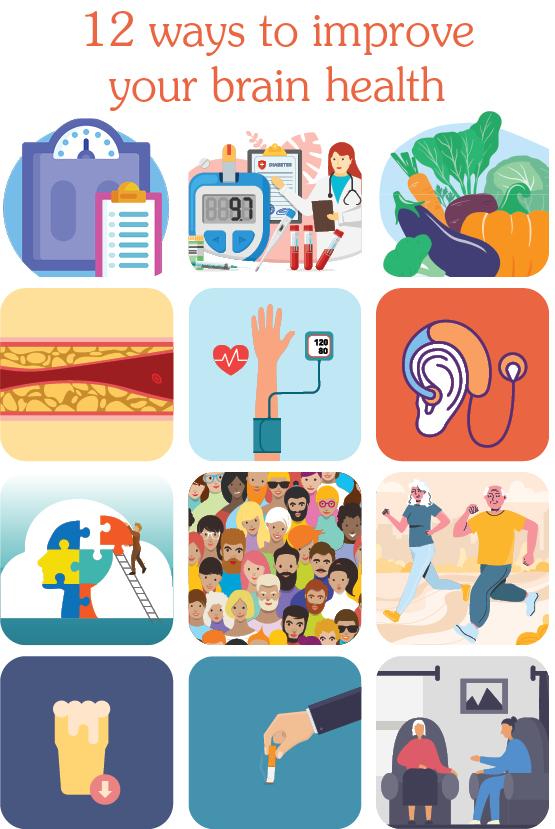Mild Cognitive Impairment (MCI)
What to do if you, or your family member, is diagnosed with Mild Cognitive Impairment (MCI).

MCI is generally defined as memory or thinking decline without significantly affecting the ability to do everyday activities. MCI can be due to a variety of causes. Some people with MCI will progress to develop dementia, others won’t progress.
If you have noticed changes or difficulties in cognitive abilities in yourself or others, ask a GP for an assessment. There are many benefits of getting an assessment, and this website also provides advice on how to get the most out of a GP assessment.
When changes in cognitive abilities are mild, results of an assessment can be inconclusive. When there are changes in cognitive abilities that don’t significantly affect your daily function, doctors may give a diagnosis of MCI.
People with MCI should visit their specialist or GP regularly for ongoing monitoring. MCI is a opportunity to focus on improving your brain health.
Types of MCI
Amnestic MCI
Amnestic MCI is the most common and symptoms include changes in memory and thinking. The person may forget important information that they had previously recalled easily, such as appointments, conversations or recent events.
Non-amnestic MCI
Non-amnestic MCI affects cognitive abilities other than memory. The person may experience changes to thinking skills, such as difficulties with language, attention, problem-solving and/or changes to their visual perception.
Dementia risk reduction for people with MCI
While people with MCI have an increased risk of developing dementia, there is growing scientific evidence that positive changes can slow down or reduce the risk of people with MCI progressing to dementia. The World Health Organisation’s 12 recommendations to improve brain health and reduce the risk of cognitive decline include:
- Quit smoking
- Drink alcohol in moderation and avoid excessive drinking
- Spend time with others and be socially active
- Take care of your mental health and seek help if you feel depressed
- Engage in activities that challenge your brain, like puzzles or memory games
- Stay physically active
- Eat a balanced diet, like the Mediterranean diet, with healthy foods
- Take care of your weight by eating well and staying active
- Control high blood pressure
- Keep your cholesterol levels under control
- Manage diabetes properly
- Protect your hearing and address any hearing problems you may have.

Ask a GP or other healthcare professionals for personalised advice about reducing your dementia risk. They can refer you to specific therapies for rehabilitation including:
- speech therapy
- occupational therapy
- physiotherapy and/or exercise physiology
- psychology
- dietician.
There is some evidence the supplement ‘Souvenaid’ may help slow progression of cognitive impairment in the early stages. It is available via pharmacies and online chemists. Read more about Souvenaid on Dementia Australia’s website.
Programs for people with MCI
Dementia Australia’s Thinking Ahead Program
This small-group program is specifically designed for people diagnosed with MCI. It comprises five educational sessions (2.5 hours each) including strategies and practical tips to manage changes as well as improve brain health and minimise your risk of developing dementia. The program is free and is available face-to-face or online (depending on your location).
For more information visit Dementia Australia’s Thinking Ahead Program.
Dementia Australia’s Brain Track App
If you want to monitor your thinking and memory over time, try Dementia Australia’s Brain Track App. The app provides brain health information through fun, travel-themed games that test your cognition. You can use the results from the Brain Track App to start a conversation with your GP or general practice nurse.
Brain training programs
Brain training involves mental exercises to improve different aspects of memory and thinking. In research studies mental exercises are usually presented on a computer, sometimes in the form of a game. If you are interested in trying computerised brain training here are some companies which offer tailored brain training programs online. You can try some of them for free but there is a monthly fee or you can buy a lifetime package.
Get involved in research
There are a numerous research studies looking into what causes MCI and its relationship with dementia. People diagnosed with MCI may like to get involved with research projects in the hope their participation might bring benefits such as access to new treatments. Some people find it meaningful to know that their participation will help others in the future.
You can register your interest via StepUp for Dementia Research and you will be matched with opportunities to participate in relevant research projects in Australia.
StepUp for Dementia Research is the first systematic and inclusive way for dementia researchers to recruit participants in Australia. I find it helps to keep me informed about research projects that I may not otherwise hear about. You can sign-up to find out more about different research studies and opportunities to participate.“
Bobby Redman, Dementia Advocate


